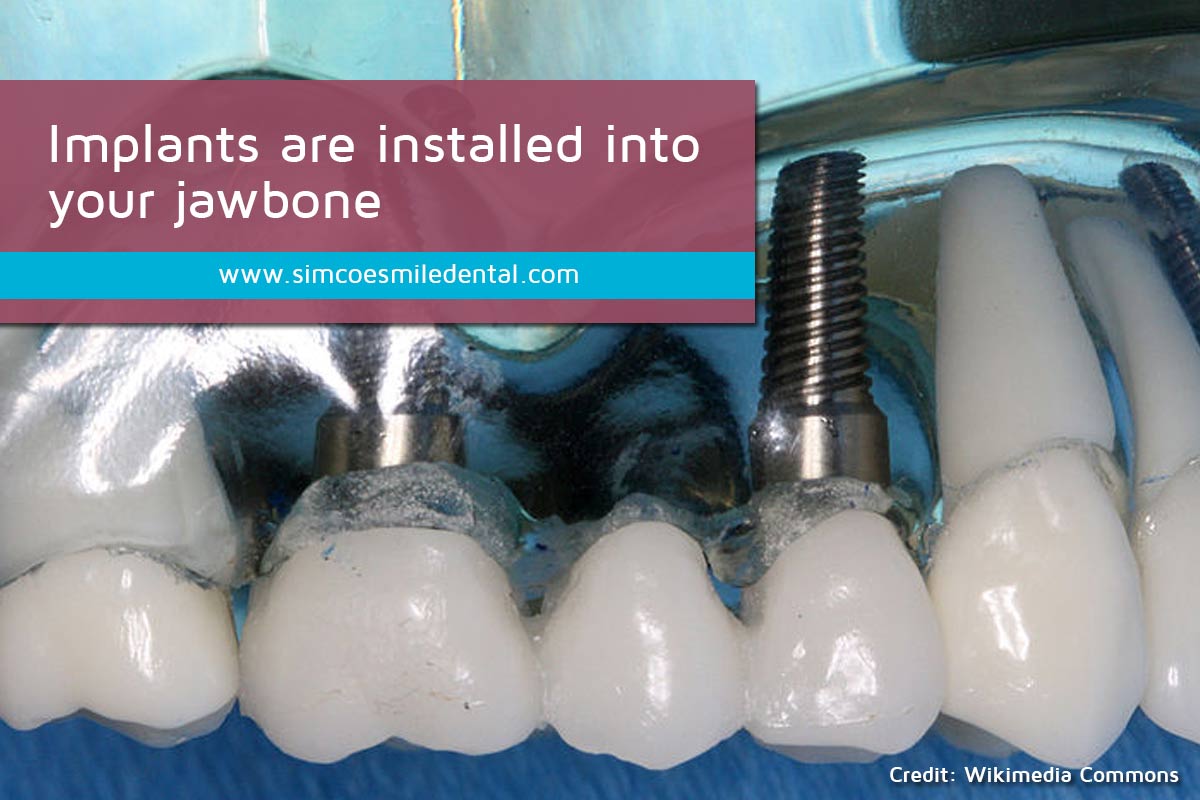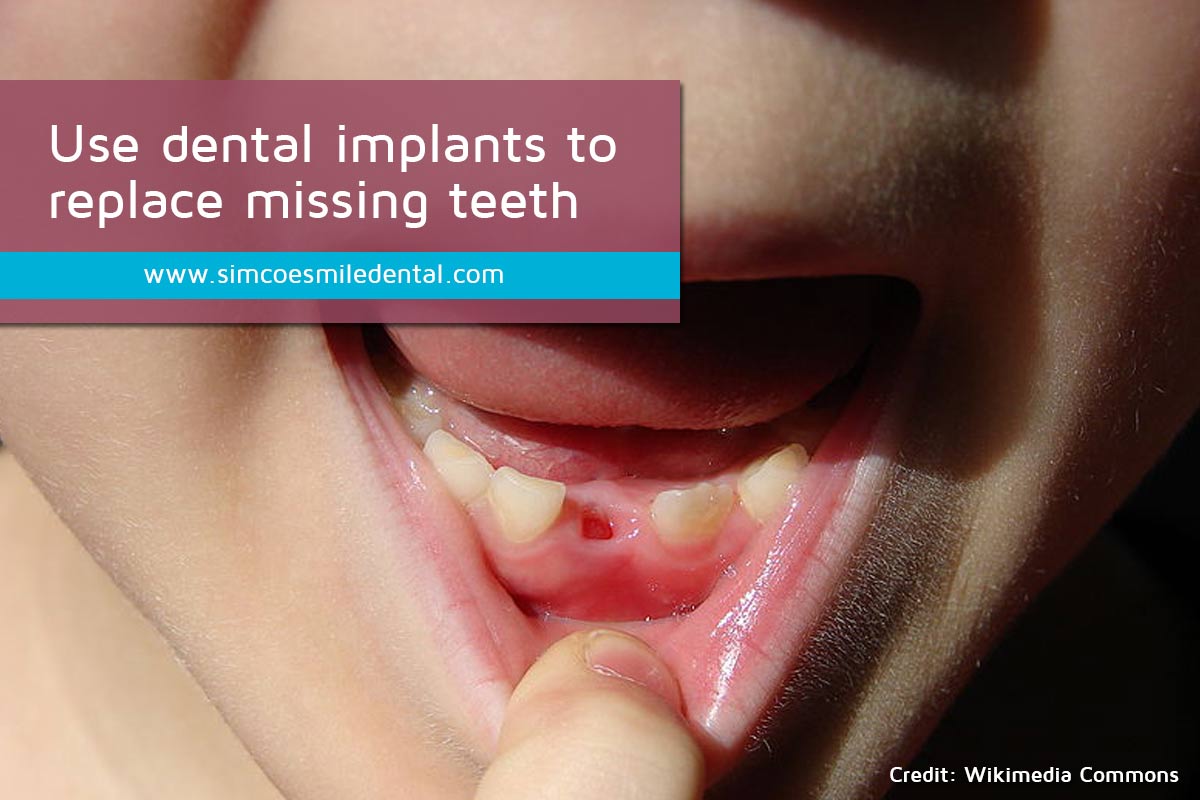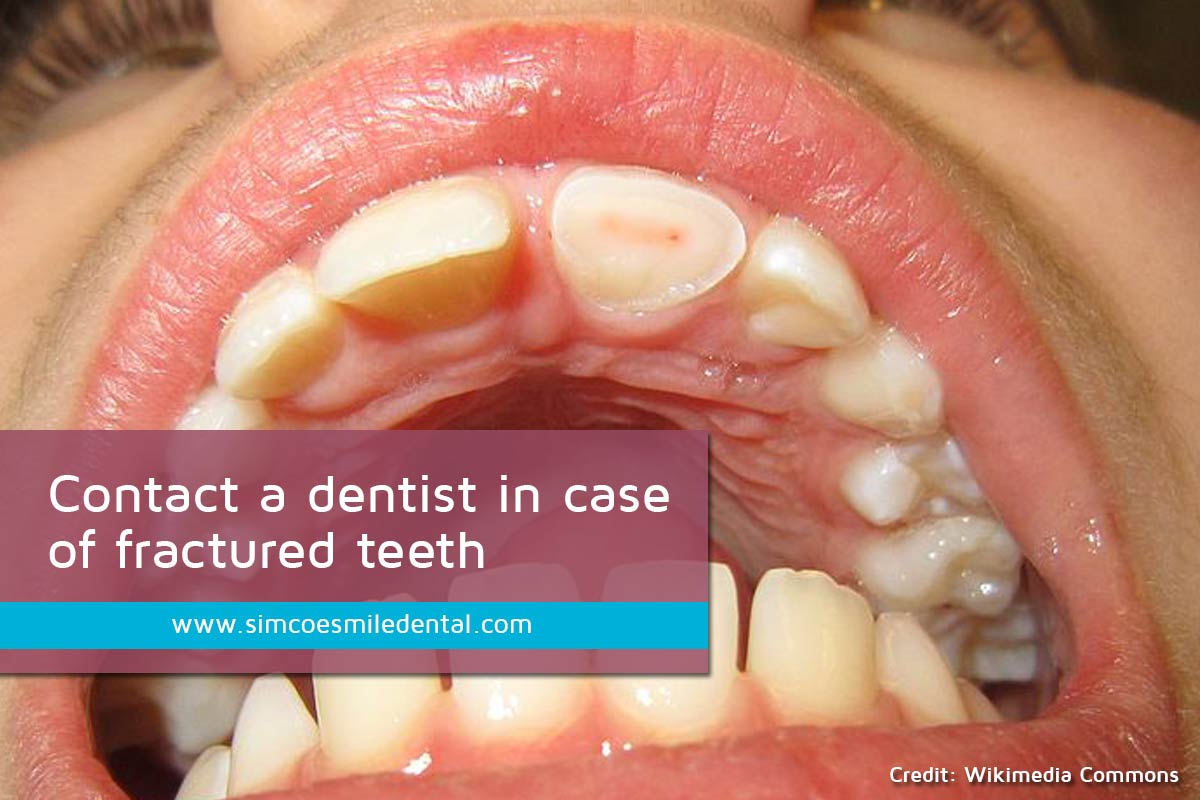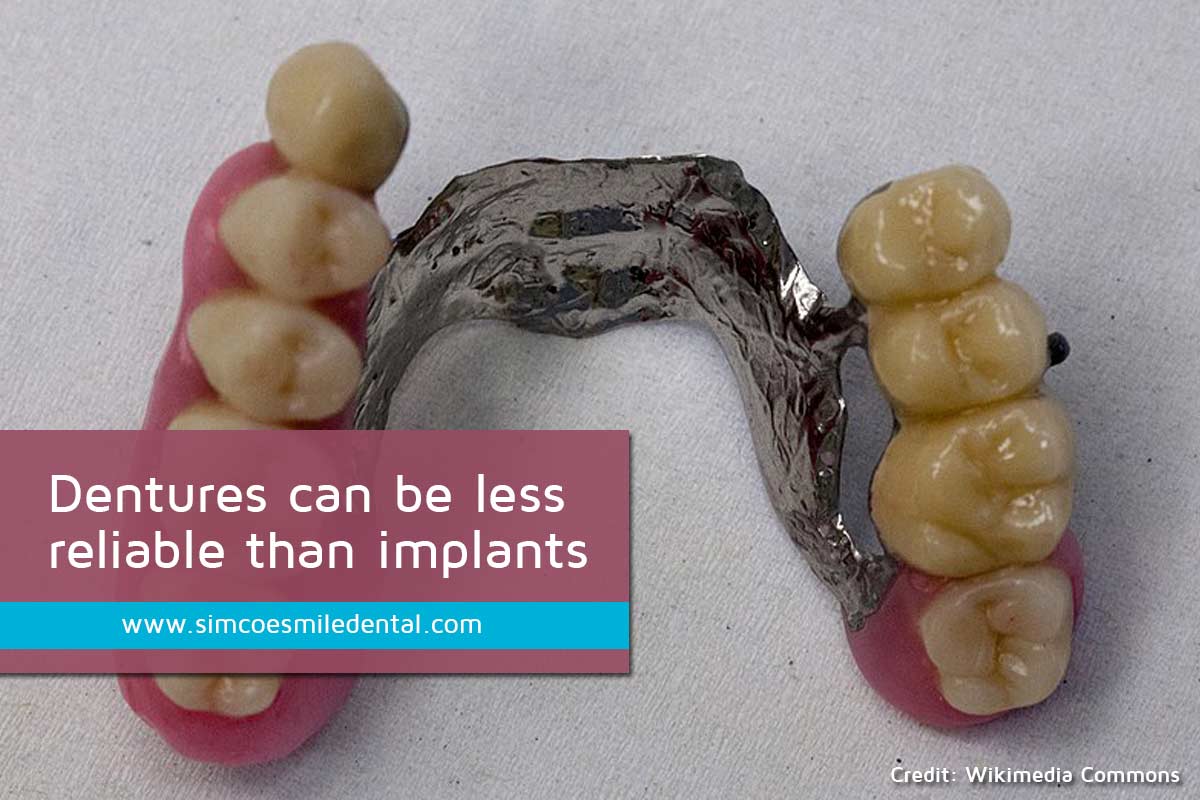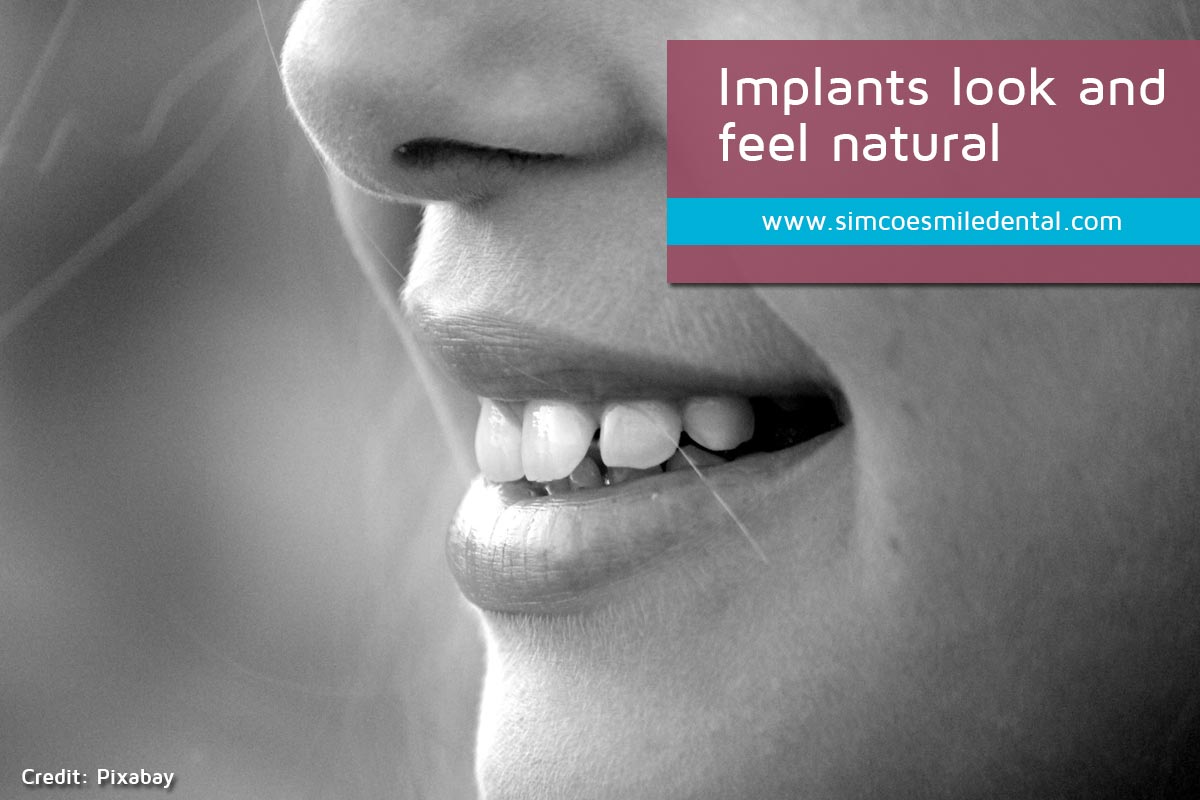You have choices when it comes to replacing lost teeth: dentures, bridges, and dental implants. You may think there isn’t much of a difference between replacement options. However, each type of dental prosthesis has its own advantages. If you’re looking for a more permanent replacement for your teeth, dental implants may be the right choice for you.
How Do Dental Implants Work?
Very basically, dental implants are permanent replacements for missing teeth. Think of them as an artificial stand-in for your natural teeth. They consist of a titanium root surgically inserted into the jaw bone where the tooth previously sat. After surgery, there is a recovery period to give the bone and implant time to fuse (a process called osseointegration). Once fused, they provide a sturdy base for an abutment that holds the artificial tooth (crown).
Dental implants generally have a high success rate and can last for years when maintained properly. Because of this, implants can be a practical long-term option for helping you regain good oral health.
How do you know when to choose dental implants over other options? Here are some indicators for when you may need implants. Keep these in mind to educate yourself about the benefits of implants.
- Missing Teeth – Many patients need implants to replace missing natural teeth. Missing teeth are generally noticeable and other people can see the gaps. For many patients, this can lead to self-consciousness. However, there is hope. Dental implants look very natural, and can blend in well with your other teeth.
Missing teeth can affect your bite and put undue stress on remaining teeth. Installing a dental implant helps balance the force of bites and avoids putting uneven pressure on any of your teeth. There are options available to replace single or multiple teeth, depending on your needs.
- Cracked Teeth – Whenever teeth sustain severe damage, your dentist’s priority is to save the tooth, if possible. However, the dentist may determine that keeping the tooth isn’t feasible. The best option then may be to extract the damaged tooth and install an implant immediately. This is usually the case when the pulp is damaged, or when infection reaches below the gingival line.
Tooth extraction and implant installation can prevent further damage and infection to the surrounding area. Infected teeth can also be extremely painful. If you have a cracked tooth that is infected, visit the dentist immediately to get it treated and relieve the pain.
In a dental emergency, contact your dentist immediately.
- Gum Disease – Damaged teeth can also affect the gums. A severe infection could spread to the gums, causing tooth loss if not caught in time. Gum disease can cause the gums to separate from the teeth, weakening the link between gum and tooth. Eventually, the tooth becomes so loose that it falls out.
Dentists usually opt to remove infected teeth before the disease can spread and cause complications. In these cases, implants can provide stability to the jaws and prevent bacteria from spreading to other areas. To avoid gum disease, maintain regular brushing and flossing to keep your mouth germ-free.
- Bone Loss in the Jaws – One thing to note about dentures is that they don’t provide adequate support for the jawbone. The force of biting puts pressure on the jaws; this pressure prompts your body to send minerals to the jaw that strengthens the bones. However, dentures only rest on the gums and don’t exert sufficient force on the bones to trigger this response. As the bone deteriorates, your old dentures no longer fit properly and require replacement. Over time, the jawbones keep regressing, resulting in a caved-in look.
In contrast, dental implants are set into the jaws, allowing them to stimulate the bones when you chew, similarly to natural teeth. This stimulation helps encourage bone growth and helps keep the jawbones healthy.
- Difficulty Chewing Food – If the natural wear and tear on your teeth over time has caused you to experience increasing difficulty eating, chewing, or speaking, yourfamily dentistmay recommend a dental implant to help you get back to normal. Using dentures and partials can also make it harder, or impossible, to eat some foods. And some conditions (like tooth-grinding) can make chewing painful.
In some cases, it may be that the teeth are damaged and require replacement with dental implants. Since implants are fused with your jaw, this gives them a more secure base when chewing. They may relieve some of the stress on your teeth, reducing the discomfort.
Switching to Permanent Options
There are many reasons why you might decide to switch from partials or dentures to dental implants. Poorly-fitting dentures can cause someone to adopt unhealthy eating habits, promote bone loss in the jaws, and result in social embarrassment if they become dislodged in a public setting. They might feel insecure about their smile or avoid social settings where their dentures might draw attention. Here are a few advantages of dental implants over dentures:
- A Permanent Solution – When you use dentures as a replacement for missing teeth, you need to replace them periodically to ensure a comfortable fit in your mouth, and to avoid chafing or rubbing against the gums, which could result in inflammation or infection if not addressed.
Dental implants are attached to your jaw like natural teeth, saving you the need to remove or replace them.
- Easier Maintenance – Dentures have to be removed at night and placed in denture cleaner to keep them clean. Then, when you put them in the morning, you have to apply adhesive to keep them in place.
Dental implants are a more permanent and convenient choice. When it comes to cleaning and maintenance, it’s just like cleaning your natural teeth–brush and floss twice a day to keep your implants clean and avoid infection.
- No Slipping – Dentures can sometimes get loose and fall out of place. This can be embarrassing when it happens — or costly, if the dentures happen to break after falling out.
Dental implants are a fixed alternative to dentures. Since they are installed into the jaws, there are no fears about them coming loose when eating or speaking. That can make them feel more like natural teeth and help you feel more comfortable in social situations.
Dental implants are a great cosmetic dentistry option for the long term. Unlike dentures, implants can last for years without having to be replaced. Consider getting them if you’re looking for more permanent replacements for missing teeth. Implants do come with other advantages (e.g. better bone support and ease of chewing) to make them yet more attractive.
Simcoe Smile Dental provides a caring service for all your dental needs. Our staff take pride in providing patients of all ages with high-quality care. We offer general family dentistry, as well as other services, including cosmetic dentistry. Call us at (289) 312-1482 or check out our contact page to make an appointment. We’re happy to help you.

